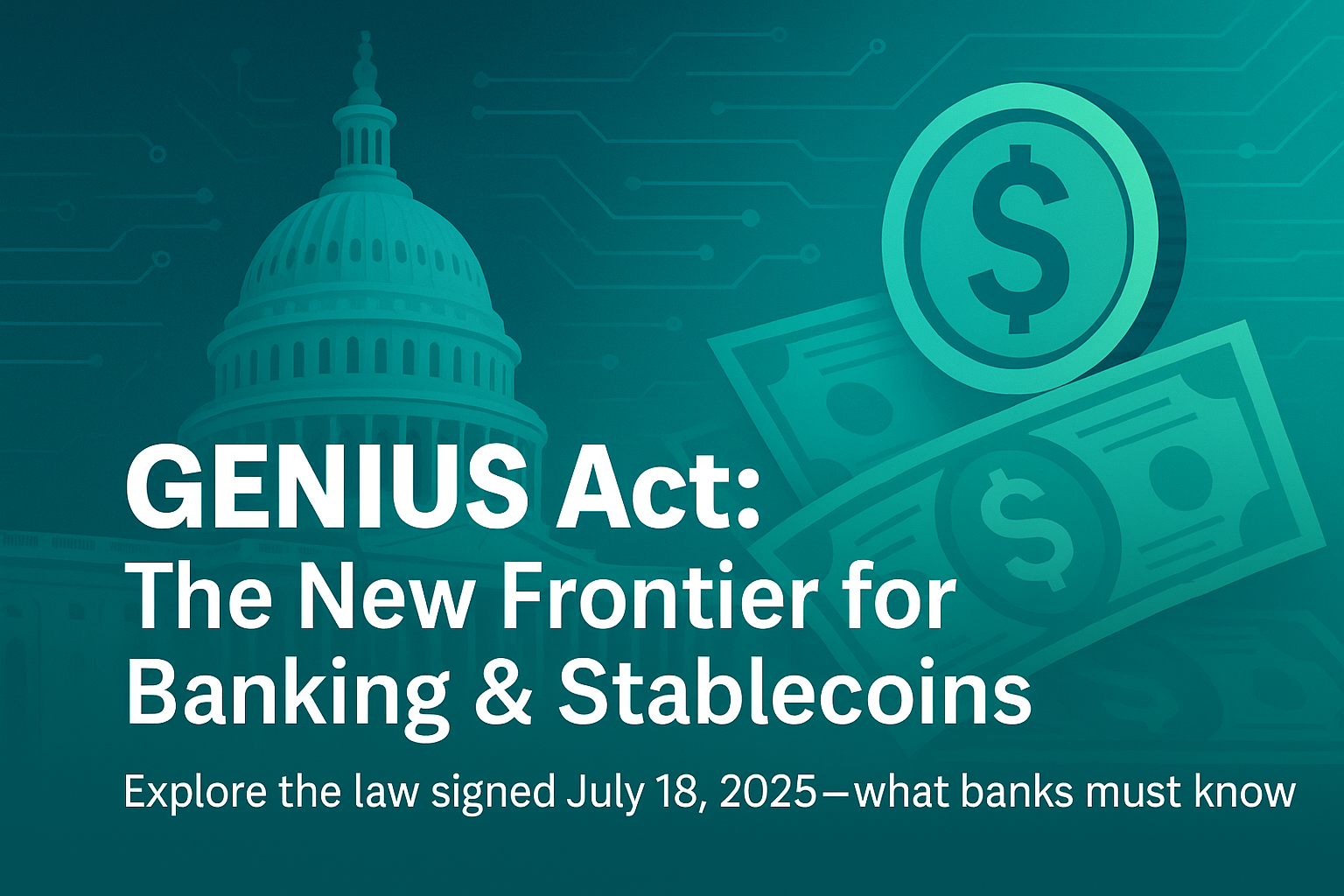The GENIUS Act, signed into law on July 18, 2025, represents a historic shift in U.S. financial regulation. For the first time, stablecoins—digital tokens pegged to the U.S. dollar or other low-risk assets—are subject to clear federal and state oversight.
For banks and credit unions, the GENIUS Act is more than a compliance update: it’s an invitation to play a leadership role in the future of money. With provisions for one-to-one reserve backing, dual supervision, and mandatory audits, the law sets the foundation for trust in digital payments.
This post explores what the GENIUS Act means for banks, why it matters now, and how your institution can prepare.
Why the GENIUS Act Matters for Banks
- Market legitimacy: Stablecoins move from the shadows of unregulated fintech into the regulated banking system.
- Revenue opportunity: Banks can capture transaction fees and retain payments relevance in a digital-first economy.
- Consumer trust: Transparent audits and strict reserve rules reduce skepticism around digital assets.
In short, the GENIUS Act bridges the gap between crypto innovation and traditional banking security.
Key Provisions of the GENIUS Act
- Full reserve backing: Every stablecoin must be backed one-to-one by U.S. dollars or approved low-risk assets.
- Dual supervision: Issuers face oversight from both federal and state regulators to ensure resilience.
- Audit requirements: Regular, transparent audits to verify reserves and safeguard customer confidence.
By codifying these rules, Congress has created a compliance regime designed to build stability in the digital asset market.
Strategic Implications for Banks
The GENIUS Act is not simply about compliance—it’s a strategic turning point.
| Strategic Area | Key Actions for Banks |
| Product Innovation | Evaluate issuing bank-branded stablecoins or offering custodial/token infrastructure. |
| Risk & Compliance | Align liquidity, reserves, and treasury processes with audit and backing requirements. |
| Technology | Invest in tokenization platforms, blockchain integration, and real-time settlement rails. |
| Partnerships | Collaborate with fintechs, wallet providers, and payment networks. |
| Customer Use Cases | Develop cross-border payment, B2B settlement, and remittance solutions. |
Implementation Roadmap (Next 12 Months)
Q3 2025 – Launch internal task force, conduct gap analysis, engage legal/compliance teams.
Q4 2025 – Begin stablecoin pilot planning: reserves, audit frameworks, tech integration.
Q1 2026 – Run limited customer pilot for real-time settlement use cases.
Mid-2026 – Scale offerings, expand partnerships, and refine board reporting.
Regulatory & Market Context
- The GENIUS Act was signed into law on July 18, 2025, making the U.S. one of the first major economies to regulate stablecoins directly.
- Banks must now balance innovation with resilience: the law mandates compliance but also clears the way for growth.
- Stablecoin activity is expected to surge as regulated players enter the field, with banks positioned to outpace fintech competitors.
How Saturn Partners Can Help
At The Saturn Partners, we help financial institutions turn regulation into strategy. From compliance automation to blockchain integration, we design roadmaps that allow banks to adopt new frameworks quickly, securely, and with confidence.
Ready to explore the GENIUS Act’s opportunities? Talk to our experts about designing a stablecoin readiness plan for your institution.

